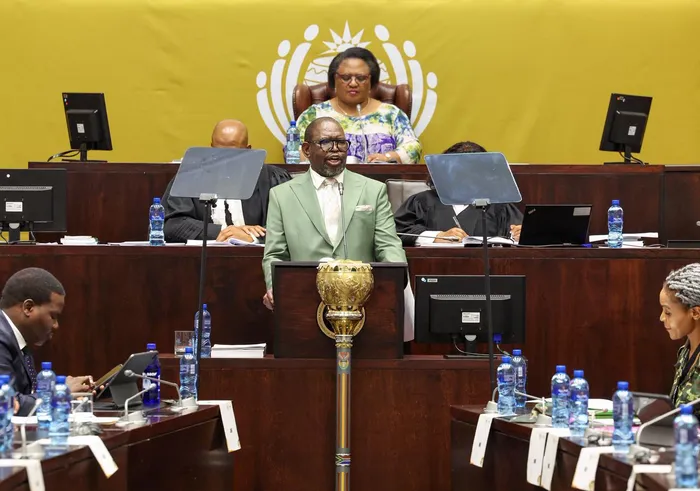MTBPS 2025: consumers left wanting as mini-budget prioritises stability over relief
CONSUMERS

While Finance Minister Enoch Godongwana’s latest Medium-Term Budget Policy Statement painted an optimistic picture for the economy, consumers were left disappointed as the budget offered little immediate financial relief.
Image: GCIS
Finance Minister Enoch Godongwana’s Medium-Term Budget Policy Statement (MTBPS) delivered on Wednesday outlined government’s plans to drive growth, stabilise debt and strengthen service delivery.
Yet for millions of South Africans struggling to make ends meet, the message was clear: relief is not coming any time soon.
The Minister said that South Africa’s main budget primary balance for 2025/26 was expected to outperform previous estimates, with revenues R19.3 billion higher than projected earlier in the year.
“There are clear signs that consistent fiscal discipline is paying off in improved investor confidence. This has been aided by sound monetary policy, which has reduced inflation and inflation expectations, enabling lower interest rates,” Godongwana said.
A key announcement was the formal adoption of a 3% inflation target, replacing the previous 3–6% range.
Godongwana said this move would lower borrowing costs and support investment over time, a change that aligns with the South African Reserve Bank’s long-term monetary policy strategy.
However, economists and consumer experts warned that this cautious approach might not do enough to ease the financial burden of South Africans already buckling under the cost-of-living crisis.
Debt Rescue CEO Neil Roets said the budget’s trade-offs left hardworking citizens in the lurch.
“The Minister has opted to prioritise debt containment, inflation reduction, and structural reform over immediate socio-economic relief,” said Roets.
“Not adjusting tax brackets for inflation is not a viable solution, as that bracket creep breaks the backs of taxpayers. Government needs to consider more aggressive support strategies for consumers facing financial distress.”
Roets said that many households were “stretched to the limit by high prices, stagnant wages and mounting debt repayments,” warning that the absence of relief measures could deepen the financial strain on families.
KPMG South Africa’s Lead Economist, Frank Blackmore, described the budget as one centred on growth and reform.
“It addressed all the key points raised before this budget. The focus was primarily on generating faster economic growth and thereby reducing unemployment and poverty,” said Blackmore.
“One of the main ways to do that was through structural reforms both within government and externally, particularly in electricity and logistics.”
He noted that the fiscal outlook appeared stable, with funds largely directed to health, education, and infrastructure.
“There was a strong focus on infrastructure development and notable progress in the electricity and network industries,” he added.
“This includes the introduction of the Basic Facility for Infrastructure, aimed at raising R15 billion through infrastructure bonds with significant private sector involvement.”
While this approach may support long-term stability, consumer analysts said that it does little to address the immediate financial pain of ordinary South Africans.
Money coach and facilitator at 1Life’s Truth About Money, Hayley Parry, said that while there were positive developments, consumers had little reason to celebrate just yet.
“From a budgeting perspective, the fact that we have budgeted for a surplus over the next three years is a significant achievement because it means we have more money coming in than going out,” said Parry.
“But for the average South African, the reality remains that there is little short-term relief.”
She explained that the lower inflation target could help consumers manage their budgets more effectively over time.
“If you have any form of debt, it should cost you less in the long term, and that should support purchasing power,” she said.
“Unfortunately, there was no clarity on whether government will adjust income tax brackets in the next fiscus, but we can hope that a healthier budget means some relief from bracket creep next year.”
Budget Insurance senior manager, Tando Ngibe, echoed this cautious optimism.
“Growth is slow at only 1.2% for next year, which likely means fewer new jobs and small salary increases,” Ngibe said.
“The small upside is that prices are not rising as fast, and interest rates might drop a little. Bonds and car repayments could feel lighter soon.”
However, Ngibe said government debt remained worryingly high, leaving little room for major tax cuts.
“The tax-free savings limit remains at R36 000 per year, and all South Africans who can afford to save should take advantage of this,” he said.
“There is no financial windfall coming, so pay off expensive debts, save where you can, and invest in your future.”
Economists continue to warn that South Africa’s debt-to-GDP ratio, currently sitting around 77%, places the country at risk of entering a debt trap.
With more than half the population living in poverty and millions relying on credit to survive, many feel the budget falls short of what is needed to ease immediate pressures.
Roets further said, “We need solutions that relieve the pressure rather than exacerbate it. Without urgent measures to support consumers, we risk deepening inequality and weakening the very foundation of our economy.”
As the government looks to mobilise private investment and strengthen public infrastructure, citizens continue to grapple with rising costs and stagnant wages.
BUSINESS REPORT